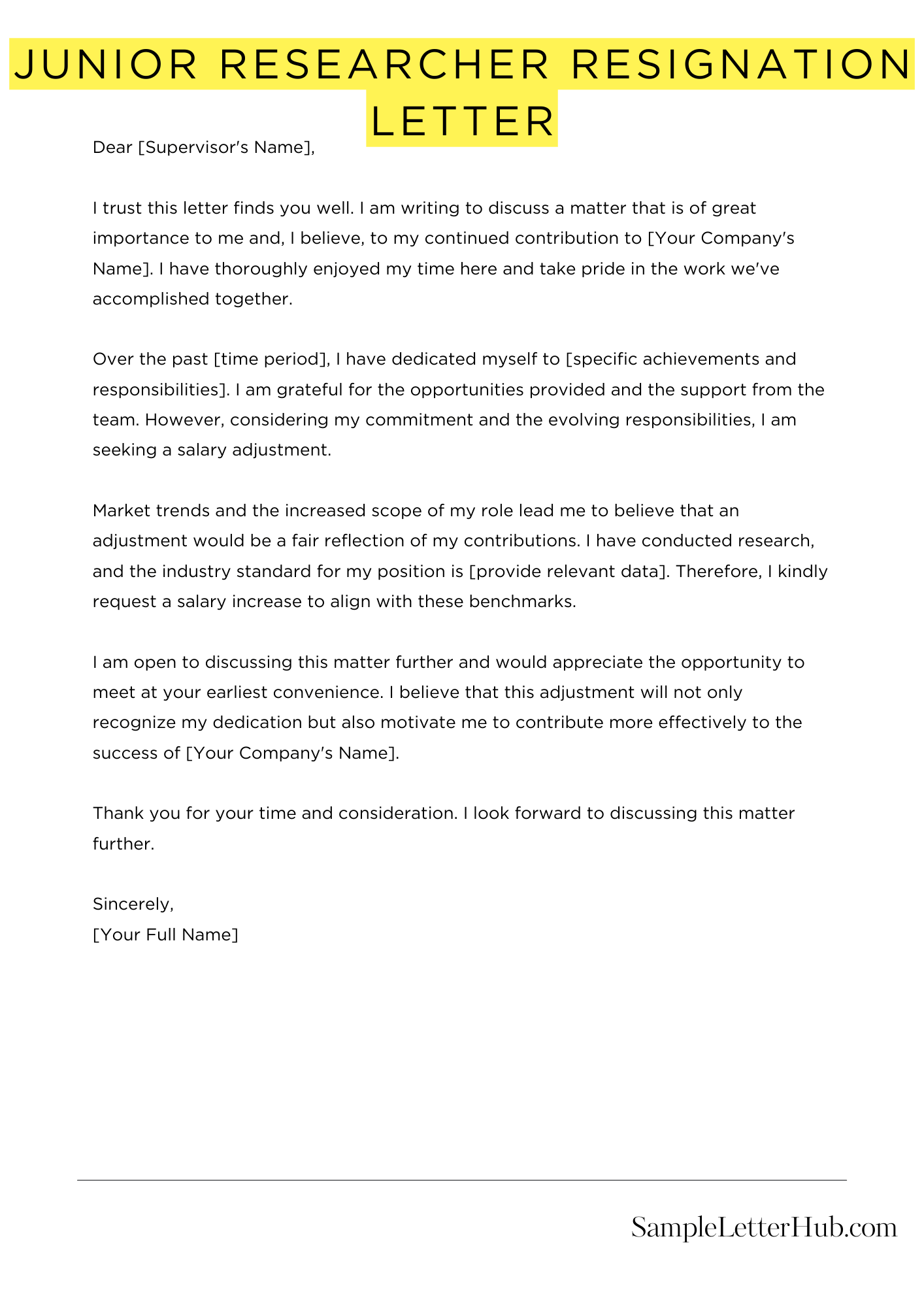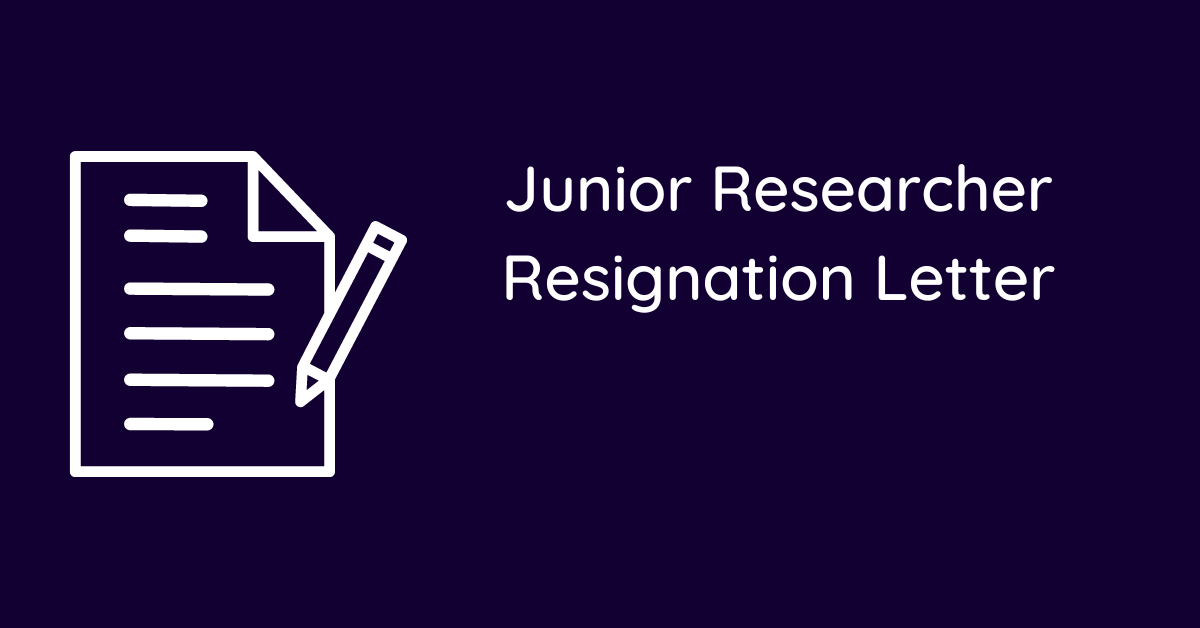When it comes to leaving a job, one of the most important steps is to write a clear and professional resignation letter. This letter should explain your decision to leave, and it should be polite and humble in tone. In this blog post, we’ll share an example of a junior researcher resignation letter that you can use as a template.
A well-written resignation letter can help you leave a positive impression on your employer, and it can also help you maintain a good relationship with your colleagues. When writing your letter, be sure to be clear and concise, and avoid using any negative language. You should also be sure to thank your employer for the opportunity to work at the company.
Below, we’ve shared a template for a junior researcher resignation letter that you can use as a starting point. Be sure to tailor the letter to your own specific situation, and be sure to proofread it carefully before submitting it to your employer.
Junior Researcher Resignation Letter
Dear [Recipient Name],
Please accept this letter as formal notification that I will be resigning from my position as Junior Researcher at [Company/Organization Name], effective [last date of employment].
During my time here, I have gained valuable experience and knowledge that I will carry forward in my future endeavors. I am grateful for the opportunities and support I have received during my tenure.
I would like to express my sincere appreciation for the guidance and mentorship I have received from you and my colleagues. I wish you and [Company/Organization Name] all the best in the future.
I will do everything I can to ensure a smooth transition during my departure. I am committed to completing all outstanding tasks and assisting in any way possible.
Thank you again for the opportunity to work at [Company/Organization Name]. I wish you and the company continued success.
Sincerely,
[Your Signature]
Short Junior Researcher Resignation Letter Sample
Please accept this letter as formal notification that I am resigning from my position as Junior Researcher at [Company Name]. My last day of employment will be [Your Last Day]. Thank you for the opportunity to grow and learn during my time here. I wish you and the company continued success. I am happy to assist in the transition process to ensure a smooth handover of my responsibilities.
I wish you all the best with your junior researcher resignation letter.
When it’s time to say farewell, expressing your gratitude and best wishes can make the transition smoother:

How to Write a Junior Researcher Resignation Letter
1. Start with a Formal Salutation
Begin your letter with a formal salutation, such as “Dear [Manager’s Name].”
2. State Your Intention to Resign
Clearly state your intention to resign from your position as a Junior Researcher. Include the date your resignation will take effect.
3. Express Gratitude
Express your gratitude for the opportunity to work at the company. Mention specific experiences or projects that you enjoyed or learned from.
4. Offer to Assist with the Transition
Offer to assist with the transition during your notice period. This could include training your replacement or completing any outstanding projects.
5. Close with a Professional Tone
End your letter with a professional tone. Thank your manager again for the opportunity and wish them and the company well in the future.
Junior Researcher Resignation Letter: 6 FAQs Answered
Resigning from a job can be a daunting task, especially for junior researchers who may be new to the professional world. To help make the process smoother, here are six frequently asked questions and answers about writing a junior researcher resignation letter:
1. What should I include in my resignation letter?
Your resignation letter should include the following key elements:
- Your name and contact information
- The date
- The name and title of the person you are resigning to
- A clear statement of your resignation
- Your last date of employment
- A brief expression of gratitude
- Your signature
2. How should I format my resignation letter?
Your resignation letter should be formatted in a professional and easy-to-read manner. Use a standard font, such as Times New Roman or Arial, and keep the letter to one page. Left-align your text and use single spacing.
3. What should I say in my resignation letter?
Keep your resignation letter brief and to the point. State your intention to resign clearly and concisely, and include your last date of employment. You can also express your gratitude for the opportunity to work at the company and wish your colleagues well.
4. When should I submit my resignation letter?
It is generally advisable to give your employer two weeks’ notice before your last date of employment. This gives them time to find a replacement and ensure a smooth transition. However, if you have a particularly good relationship with your employer, you may be able to negotiate a shorter or longer notice period.
5. What if I’m not sure how to write a resignation letter?
There are many resources available online that can help you write a resignation letter. You can also ask a friend, family member, or career counselor to review your letter before you submit it.
6. What should I do after I submit my resignation letter?
Once you have submitted your resignation letter, it is important to maintain a positive and professional attitude. Continue to perform your job duties to the best of your ability, and help your colleagues with the transition.
Before making the decision to resign from your job, it’s essential to consider the legal aspects:
Understanding your emotions after quitting your job is important. Explore why you might be feeling sad:
Related
- Resignation letter sample
- Forced resignation letter
- Resignation letter due to going abroad
- Resignation letter due to marriage
- Resignation letter due to other opportunity
- Resignation letter due to mistake

